Feature
Ensuring Basic Human Rights
Working with Businesses to Protect Human Rights
Creating a Platform for Collaboration!
Cocoa Free from Child Labor
Today, it is estimated that more than one out of every five children in Ghana is involved in child labor. Child labor is found in cocoa production in Ghana, and Japan is a significant importer of Ghanaian cocoa. To combat child labor and other development issues, JICA has launched a new platform for co-creation and collaboration.
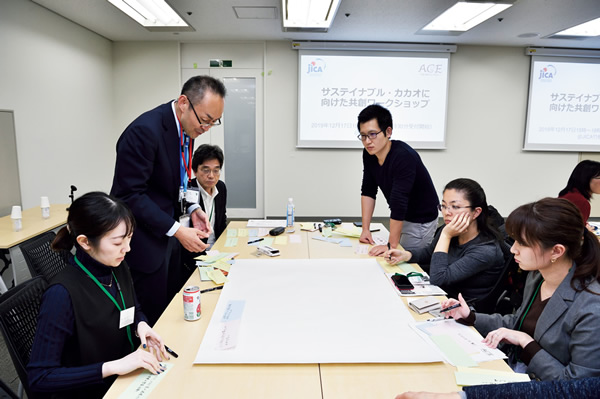
Participants from organizations such as research institutions and confectionary companies worked together to identify current issues and future goals from their respective viewpoints.
JICA is strengthening its collaboration with academia, industry, government, and civil society organizations to solve global issues. An example of this is the Platform for Sustainable Cocoa in Developing Countries, which was launched in January 2020.
"We need a forum where the stakeholders can work together solving the issues surrounding the cocoa sector such as child labor, deforestation, and rural poverty," explained Nakamura Toshiyuki of JICA's Governance and Peacebuilding Department. "To that end, a wide range of parties involved in the cocoa sector such as chocolate manufacturers, consulting firms and NGOs have joined the platform."
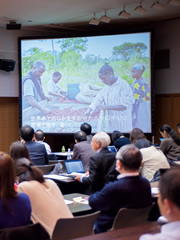
On February 5, 2020, ahead of Valentine's Day, a general public event was held on sustainable cocoa.
Child Labor in Cocoa-producing Areas
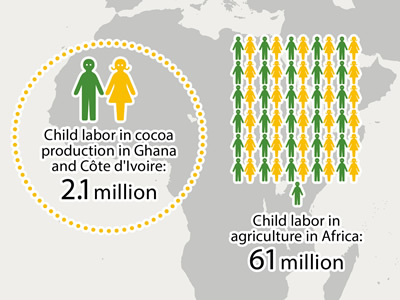
"Child labor" refers to labor carried out by children under the minimum working age (15 years), and dangerous and harmful labor carried out by children under the age of 18 as determined under international treaty and law. Child labor is a worldwide issue particularly in the countries of West Africa, where approximately 70 percent of the world's cocoa beans are produced.
Child labor in cocoa production in Ghana and Côte d'Ivoire:
2.1 million
Child labor in agriculture in Africa:
61 million
Source: Created based on information from the International Cocoa Initiative.
Poverty as the Background for Child Labor
To prepare for the establishment of the platform a workshop was held in December 2019. The workshop attracted more than 60 participants from organizations such as cocoa industry groups, confectionary companies, trading companies, and NGOs.
In the opening speech of the workshop, His Excellency Mr. Frank Okyere, Ambassador of the Republic of Ghana to Japan, explained the situation of the cocoa industry in Ghana. Although the cocoa market has an annual transaction value of 210 billion yen (approximately USD$2.1 billion) and contributes greatly to the national budget, the average small-scale cocoa farmer, of which there are approximately 800,000, earns only about 50 yen (approximately 0.5 dollar) a day.
Poverty is a direct cause of child labor. Cocoa production is labor-intensive, and children are an important labor source for farmers too poor to hire adult workers. If the children grow up without learning to read and write at school, then it would be difficult to break the poverty cycle. A situation which brings the sustainability of the cocoa industry into question.
Efforts to Combat Child Labor
Japanese society and industry have not been idle spectators.
The Government of Japan is preparing a national action plan, to be announced in 2020, to implement the Guiding Principles on Business and Human Rights endorsed by the UN Human Rights Council in 2011. Many Japanese companies are also working to fulfill their human rights responsibilities in accordance with the principle.
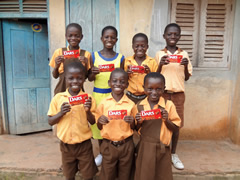
Morinaga & Co., Ltd. contributes a portion of its chocolate sales to support cocoa-producing communities in collaboration with the NGOs, Plan International and ACE.
More than 130 people attended the inauguration of the platform in February 2020, where the Japanese companies and NGOs shared their efforts to solve human rights issues in the cocoa supply chain.
Some companies are supporting cocoa farmers to increase their incomes through improved cultivation and processing techniques. Other companies are supporting communities to conserve forests by promoting agroforestry in collaboration with JICA. ACE, an NGO working to address the issues of child labor around the world, has been active in Ghana since 2009. ACE provides school supplies for poor households and is creating mutual support systems for farmers. The projects have successfully protected over 500 children in 10 villages from child labor, and have improved the education environments of around 4,500 children. Since 2018, ACE has been working together with the Government of Ghana in establishing Child Labor Free Zones in Ghana.
Realizing Sustainable Cocoa through an All-Japan Effort
"Ten years ago, it was not easy to work together with industries and private companies on issues such as child labor— the platform is a sign that circumstances are changing," said ACE Managing Director Shiroki Tomoko. "Previous projects were small-scale with limited effects. Through collaboration, we should aim at making a big impact," she stressed.
Other participants also commented that while companies make efforts to pay a "fair" price to the farmers, consumers are not willing to shoulder the additional cost. By understanding the background and making informed choices about the things that we buy, we can lend support to such efforts. Sustainable cocoa must be realized not only by companies and NGOs, but by society as a whole.
His Excellency Mr. Frank Okyere
Ambassador of the Republic of Ghana to Japan
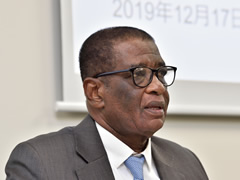
"Ghana is committed to achieving the goal of eliminating child labor. We welcome Japan's support in this agenda."




scroll